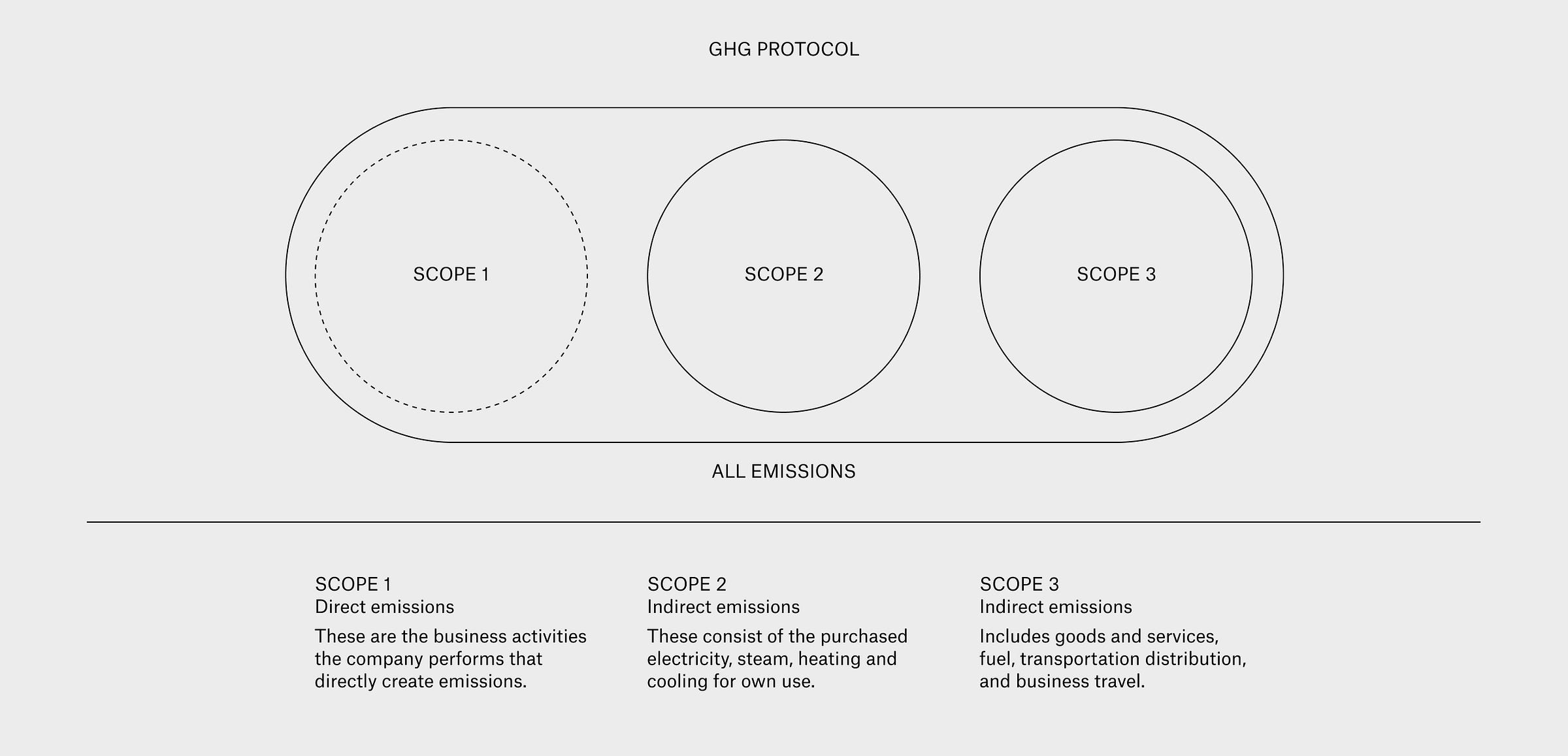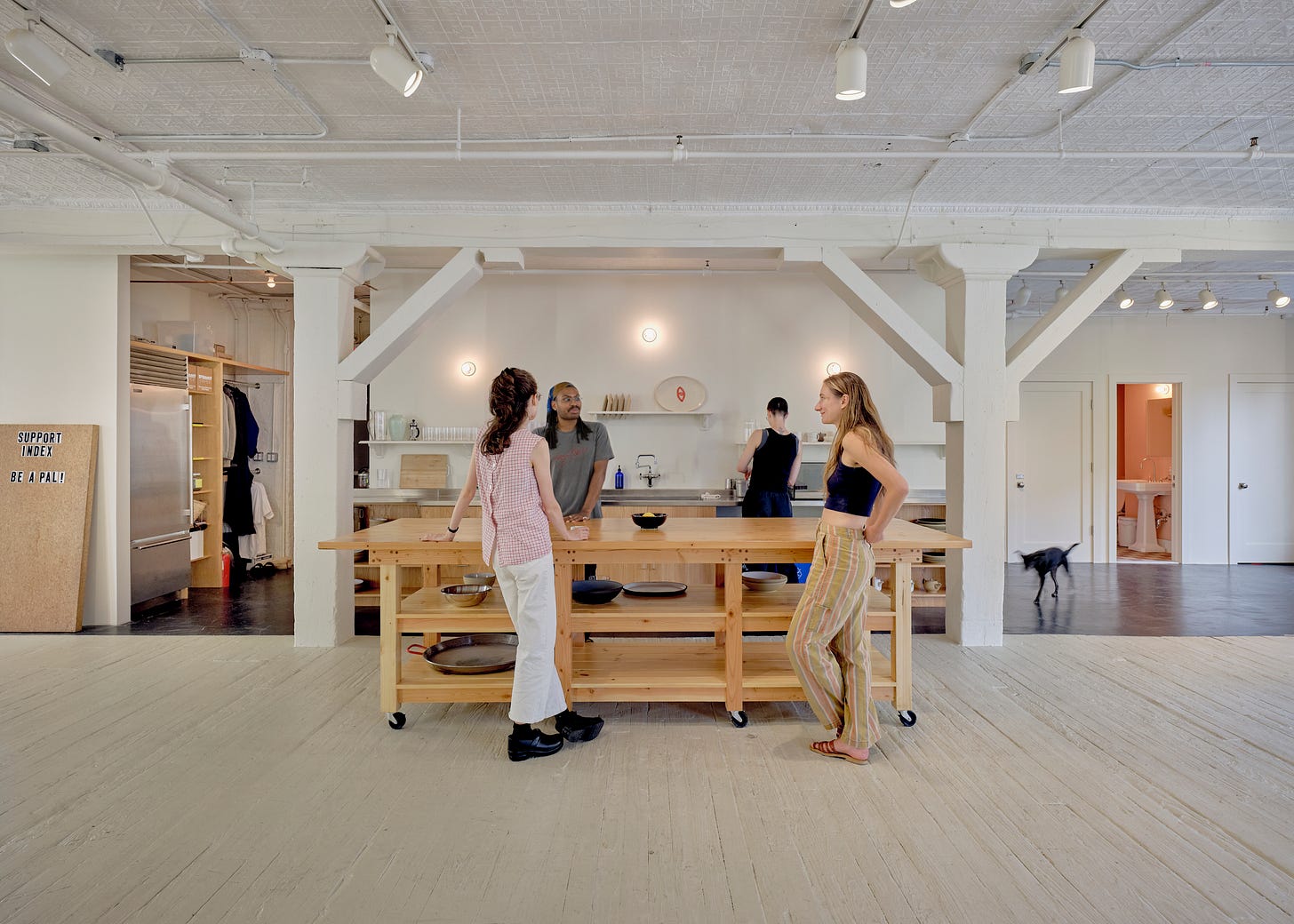garden3d 2023 Sustainability Report
Reviewing our impact as a growing creative business amid a changing climate.
Introduction
We’re excited to share our fifth annual garden3d Sustainability Report. As with our other reports, we’ll check in on our carbon footprint from the previous year, review the goals we have been working towards, and make new commitments for the future. This year we’ll also include the carbon footprint of our new studio space, Index, and the build out. You can find our report from 2019, 2020, 2021, and 2022.
Our 2023 Sustainability Efforts in a Nutshell
In 2023, we opened up a 4,000 square-foot space in Chinatown, New York City! Index is a multi-purpose space that functions as our office, a co-working and community center for peer-led programs like courses, workshops, and events.
Because Index is an important part of the broader garden3d business, we want to account for the greenhouse gas (GHG) emissions entailed by our operations of Index IRL in our overall count. This report includes the carbon footprint for the space and renovation, and explains how we calculated it. A big thank you to our architects at 31 ARCH for generously collaborating with us in order to collect the necessary data for the report!
Our studio size changed from 30 full time employees in 2022 to 28 at the end of 2023. We’ve consistently been around this number of employees for the past few years. We calculate and include the carbon emissions per employee every year, which is an important data point to have as a benchmark year over year, especially when opening a space or if we decide to grow in the future.
Throughout last year, we purchased carbon offset credits that reflected 150% of our 2022 carbon footprint, which were 65.8 metric tonnes CO₂e. We purchased offsets at an average price of $100 per tonne, compared to the average market rate of $5-$15 per tonne CO₂e (a price range we feel is way too low!). In total we purchased offset credits for 99 tonnes of CO₂e at $9,823.30 (including Patch.io fees) (= 65.8 tonnes * 150% * $100/ tonne). The offset credits we purchased came from two categories: greenhouse gas emission avoidance and greenhouse gas emission removal.
We purchased 20 tonnes of CO₂e offset credits from the project CarbonCure Concrete Mineralization who injects CO₂ into cement to make super-strong low-carbon concrete (receipt here).
We also purchased 40 tonnes of CO₂e offset credits from Tradewater US Refrigerant Destruction, a project creating end-of-life solutions for refrigerants that are both potent greenhouse gases and ozone depleting substances (receipt here).
The third project we bought offset credits from was Lithos Carbon Enhanced Weathering who focuses on decarbonizing crops and improving soil health, while paying farmers carbon revenue. We purchased 7 tonnes of CO₂e offset credits from them (receipt here).
Last but not least, we purchased 32 tonnes of CO₂e offset credits from Grassroots Carbon Regenerative Grazing (receipt here). Their mission is to incentivize ranchers to adopt regenerative practices that create healthier soil, a process that offers the capacity to store 25% of all US CO₂ emissions each year.
In 2023, our annual week-long team retreat was in New York City. This allowed us to give all team members an opportunity to visit our newly-opened Index space in Chinatown, and to be mindful of and reduce our cost and carbon emissions for flights. We have 13 employees based in NYC, so roughly half of the company traveled from outside of NYC for the retreat.
Seaborne, our sustainability consultancy, continued to work with clients to measure, reduce, and mitigate its CO₂ emissions. We worked with cat food company, Smalls, to quantify the lifecycle carbon footprint of their cat food products, and create strategies on how to further reduce and mitigate their carbon emissions. Seaborne also worked with Index to include the community in conversations about climate. Lastly, we funded and published Substantive Sustainability Gets More Clicks, our original research quantifying the impact of science-backed sustainability initiatives in e-commerce communications (a.k.a ad click-through rates). More details further down in the report!
We continued to make use of the sustainability guidelines in our Moral Compass when deciding to take on new clients.
garden3d’s 2023 Climate Impact
For our studio carbon footprint calculations, we used the same process that we developed in 2019 (take a look at our 2019 Sustainability Report for more details). We’ve captured this year’s data by breaking out our emissions into the Greenhouse Gas Protocol (GHG) three scopes in the spreadsheet below.
→ Check out our 2023 Calculations.
This manual calculation method is based off the GHG Protocol’s framework for assessing emission “scopes.”
Index
Utilizing the same scopes and similar methods to our normal garden3d GHG accounting, we were sure to account for the emissions related to retrofitting our leased space at 120 Walker St. Our GHG accounting for Index in 2023 includes the embodied carbon in the materials we purchased for the space like flooring, seating, air conditioning, and refrigeration.
We began Index operations in May 2023, so our 2023 report also includes the emissions from operating the space day-to-day since then, including the emissions from the electricity we use and the waste we generate.
Scope 1
This is the first year that we have emissions under Scope 1 due to our newly-acquired workspace, Index. Most buildings worldwide still use fossil fuels to generate heat for water and workspaces, which release greenhouse gases when burned that are accounted for under Scope 1.
Scope 2
Our Scope 2 emissions grew significantly in 2023, with a more than 3x jump in total kg CO₂e. This growth is due to our increase in purchased energy related to building and operating the physical space for Index. We expect this higher level of Scope 2 emissions to continue into the future as long as we operate Index, however we are also interested in finding ways to purchase cleaner electricity in the future. Per square foot, Index uses less energy than other commercial office spaces because the activities onsite are not particularly energy-intensive.
Scope 3
The majority of our carbon emissions as a company fall in Scope 3, which is true of most companies. A major source of Scope 3 emissions in 2023 came from our build out of Index. Renovating the office space for Index entailed about 20 metric tonnes of CO₂e, which reflects the embodied carbon in the purchased materials like air conditioning, furniture, and building materials.
For the rest of the garden3d business, our Scope 3 emissions were around 28 metric tonnes of CO₂e in 2023, which included the emissions from flying people in for our week-long company retreat in New York, and from employee travel for client projects. Lastly, as a software development company, the energy we use for cloud computing is another major source of our Scope 3 emissions.
Here are our final calculations for 2023 as per the GHG Protocol:
Scope 1 (15%)
Build out: Heating — 820 kg CO₂e
Operations: Heating — 3,757 kg CO₂e
Total Scope 1 Emissions = 4,577 kg CO₂e
Scope 2 (14%)
Build out: Electricity — 1,280 kg CO₂e
Operations: Electricity — 2,944 kg CO₂e
Total Scope 2 Emissions = 4,224 kg CO₂e
Scope 3 (71%)
Build out: Waste — 800 kg CO₂e
Build out: Purchased Materials — 20,280 kg CO₂e
Operations: Waste — 506 kg CO₂e
Total Scope 3 Emissions = 21,586 kg CO₂e
Total 2023 Carbon Footprint Emission for Index = 30,387 kg CO₂e
garden3d
Scope 1 (0%)
Scope 2 (3.5%)
Studio Electricity — 1,024 kg CO₂e
Total Scope 2 Emissions = 1,024 kg CO₂e
Scope 3 (96.5%)
Laptops — 1,935 kg CO₂e
Privately owned vehicles for Employee Commuting — 107 kg CO₂e
Other Employee Commuting — 124 kg CO₂e
Business Travel - Flights — 7,144 kg CO₂e
Business Travel - Trains — 275 kg CO₂e
Cloud Computing & Web Hosting — 4,312 kg CO₂e
Miscellaneous (Team Meals & Entertainment, Education, Insurance and more) — 14,710 kg CO₂e
Total Scope 3 Emissions = 28,606 kg CO₂e
Total Carbon Footprint Emission for garden3d = 29,630 kg CO₂e
Total Carbon Footprint Emission for Index & garden3d 2023 = 60,017 kg CO₂e
Comparison to last year
In comparison to 2022, where our total carbon footprint was 65.8 metric tons CO₂e, our total in 2023 was lower by 8.79%. Our 2022 carbon footprint per employee was 2,194 kg CO₂e, and our carbon footprint per employee in 2023 decreased by 2.28% to a total rate of 2,144 kg CO₂e per person.
Note: The decrease in our 2023 carbon footprint compared to 2022 surprised us somewhat, considering that we renovated and began operating a physical office space in 2023. As a company, we did fly much less in 2023 than in 2022 which helped to cut our total carbon footprint. However, we also believe that we overestimated our flight-related emissions for 2022. This year, we have referenced several external sources to quality check our flight emissions conversions.
Index
In 2023, the build-out and operation of Index contributed an additional 30.4 metric tons of CO₂ equivalent emissions (mTCO₂e) to the total emissions of garden3d. Of that 30.4 mTCO₂e in 2023, about 75%, or 23.2 mTCO₂e can be attributed to the emissions from building out the new space.
The vast majority of emissions from building out Index are in Scope 3, that is, the embodied emissions in our material purchases. In particular, installing an air conditioning system for the workspace at Index was the single largest contributor to the embodied emissions in the build-out process.
Index’s operating emissions primarily come from the energy used to heat and power our space, though our emission estimates do account for the different types of waste generated onsite.
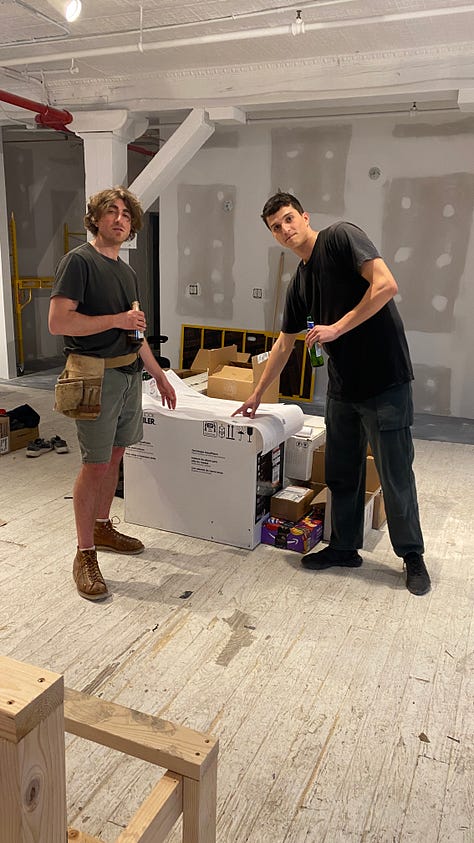
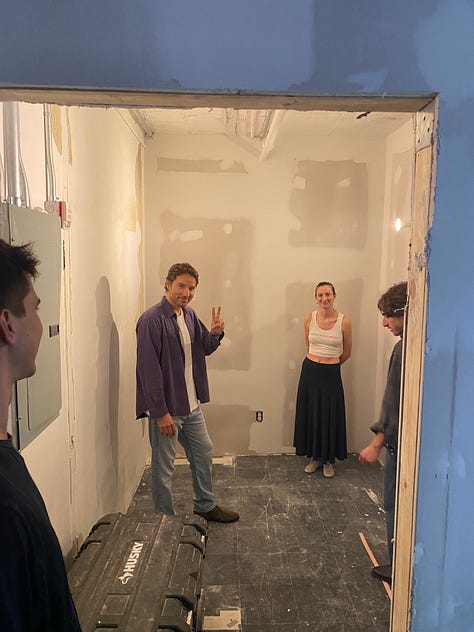
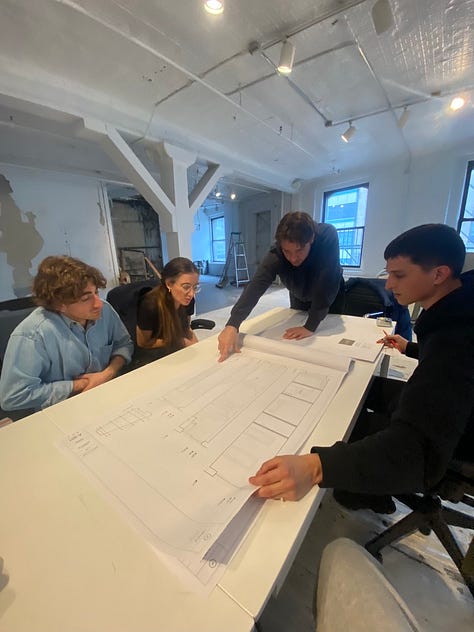
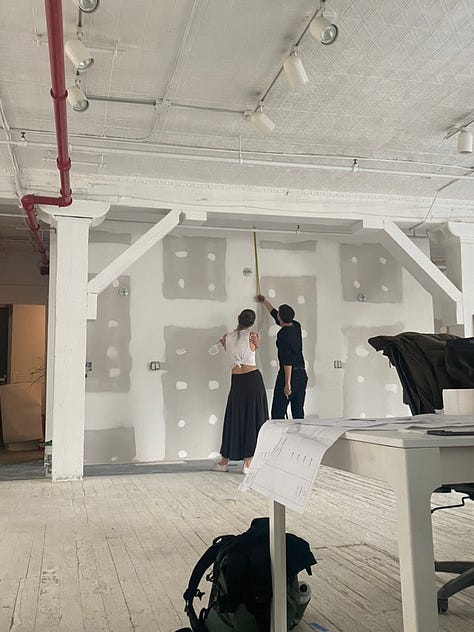
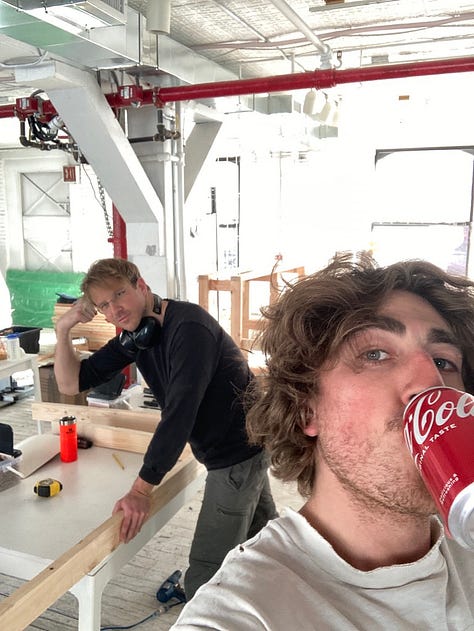
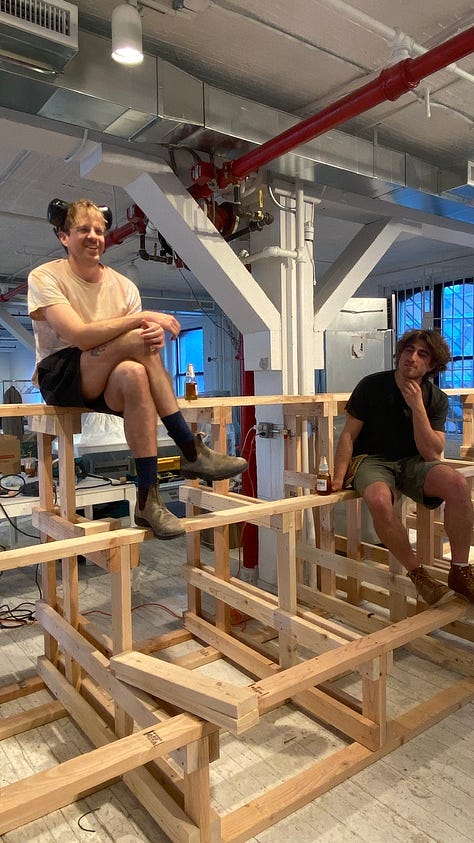
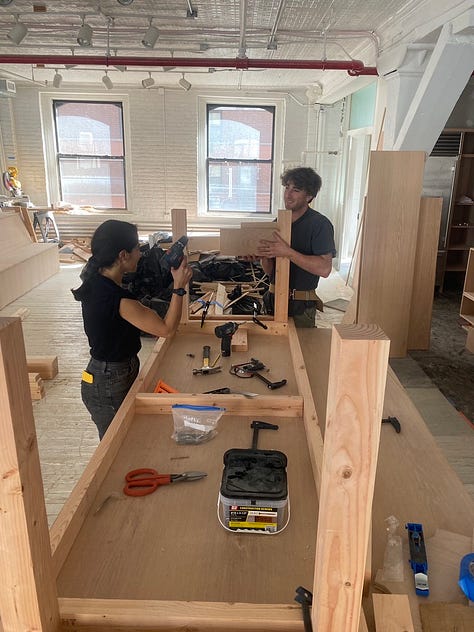
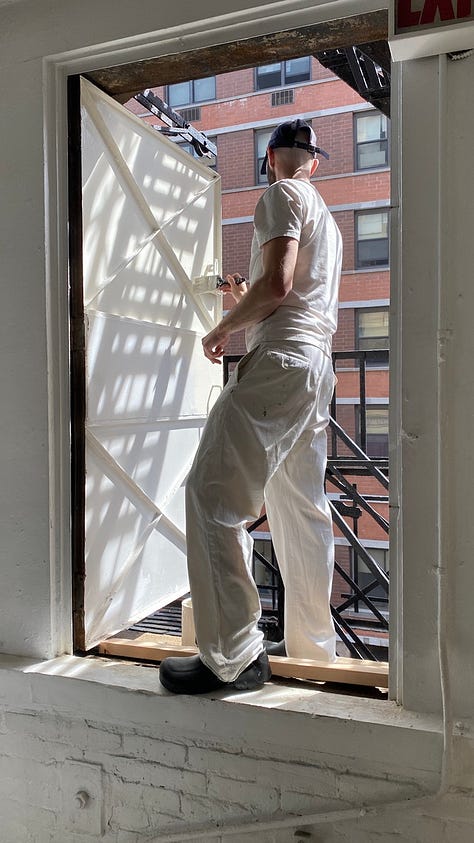
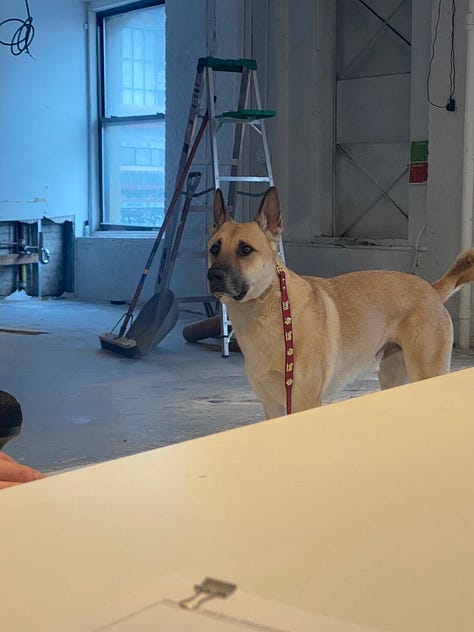
Index: Comparison to garden3d
The total emissions in 2023 from building and operating Index (30.4 mTCO₂e) are about equivalent to the total emissions from operating the entire rest of the garden3d business (29.6 mT CO₂e).
Because we will make use of the durable investments we made in the Index space over many years, we expect our future year-to-year emissions from operating a physical location for Index to be much lower than they were in 2023.
garden3d
Our garden3d business-related emissions decreased in 2023 due to to a decrease in the number of employees. Our total headcount impacts our emissions when it comes to work-from-home electricity, laptops, transportation, social activities, supplies and materials, and more. We had our retreat in New York City, which is where the majority of our employees are based. This meant that we needed to provide flights and hotels to fewer employees, and a good handful of employees were able to travel to New York by train.
During 2023, we also took further steps to reduce our bandwidth and server usage. Primarily, we spun down a bunch of servers that were sitting idle with Fly.io, and combined two Ruby on Rails apps into a single instance, so that we could reduce our Heroku usage, too. These changes resulted in a saving of 2,627.24 kg of CO₂e (which is roughly the amount of carbon used in three flights between NYC & LA).


Offsetting Our 2023 Carbon Footprint
As with last year, we will purchase carbon offset credits at an average rate greater than $100 per tonne of CO₂e removed or avoided to offset our 2023 greenhouse gas emissions. As our total carbon footprint for 2023 was 60.02 metric tons CO₂e, and we carbon offset 150% of our total emissions, that comes out to a cost of $9,003.
In order to distribute our positive impact, we’ll be spending that budget over the next six months on greenhouse gas avoidance and removal projects that we find compelling. In next year’s sustainability report, we will share which offsets we purchase, the amount, and the reason why we’ve chosen the specific projects.
Beyond Offsets & Looking Ahead
Client Selection Framework
Through economic ups and downs, we consistently follow our Moral Compass when vetting client work for the studios in Garden3D. Within the sustainability category of our Moral Compass, we’ve established that we won't work with:
Hyper-consumerist products (like fashion, cosmetics & beauty products) that can’t show a valid sustainability initiative.
Hype- or desire-driven industries that survive on short, focused bursts of (mass-produced) cycles to sustain the business.
Products that claim a level of sustainability, but obviously undermine it, i.e. obvious greenwashing.
“Premium mediocre” products (cheap, mass produced) where the only value or innovation to the category is aesthetics or branding.
Seaborne — Our Sustainability Consultancy
Seaborne, our sustainability consultancy, is dedicated to sustainability strategy and accounting work. Across our studios, we’ve found that clients want to implement meaningful sustainability efforts yet lack the time or skills to take on this work themselves. That’s the challenge and need that Seaborne meets!
Checking In On Our 2023 Goals
In 2023, we set the following goals:
In January 2023, we signed a lease on a new studio space in Chinatown, NYC. We said we’d include the carbon footprint of this space in this year’s report!
We wanted to continue to grow Seaborne and create even more alignment across our studios. We continued to work with great clients and we wrote and published an internal training handbook so all employees can speak to the importance of our sustainability services. Get in touch if you’d like to learn more about working with Seaborne.
Seaborne and Index are working together to find new ways to include the community in conversations about climate. The two studios co-hosted a Collective Reading of A Planet to Win: Why We Need a Green New Deal as well as A Practical Guide to Sustainable Package Design, in the Fall of 2023.
We wanted to continue to release essays on our Substack that expand and share our perspectives on corporate environmental responsibility, to stimulate thoughtful conversations in this space. Toward this end, we funded and published to Substack our original research quantifying the impact of science-backed sustainability initiatives in e-commerce communications (a.k.a ad click-through rates). Read about why substantive sustainability gets more clicks here.
We also took further steps to reduce our bandwidth & and server usage, and these changes resulted in a saving of 2,627.24 kg of CO₂e (which is roughly the amount of carbon used in three flights between NYC & LA).
We wanted to continue to offer a 10% rebate to any project or client (across all garden3d studios) that can show a meaningful, substantive sustainability initiative (or commit to working with Seaborne to build one). We continued to offer this rebate in 2023!
Operating Index NYC as an expression of our values
In our day-to-day operations at Index, we have choices to make about the supplies we stock for amenities and cleaning. We provide our members with coffee, sourced fair trade from NYC importer Porto Rico; local milk, sourced in glass bottles (which we return every week!) from Ronnybrook Farm; and oat milk, sourced from Minor Figures, a company that sends an estimate of our emissions per order upon each delivery.
Our studio is professionally cleaned twice per week. Whenever we can, we buy cleaning products like dishwasher detergent, soap, and all-purpose cleaner in bulk (to reduce delivery frequency and packaging) from brands like The Unscented Co and Dr. Bronner’s.
Our toilet paper comes in bulk from Plant Paper, and is made from bamboo. Conventional toilet paper comes from old-growth forests, requiring carbon-intensive processes to break down pulp, and uses toxic chemicals like formaldehyde to achieve “fluffiness.” The entire Plant Paper supply chain is plastic-free, and the brand’s New York-based founding team is involved and committed to sustainability in every way.
We’re able to make some of these choices because of our size: Index currently has ~50 members, ~25 of whom use the space on a daily basis. Upkeep, at this scale, isn’t a huge lift, so we can can make choices that prioritize sustainability, even if they’re not the most convenient.
For example, we don’t keep paper towels on hand; instead we use reusable dish towels. Laundry service is expensive, and requires pickup by vehicle, which puts more traffic on our New York City streets. We also wouldn’t have control over the chemicals used for laundry.
So, our studio managers bring towels home weekly (on public transit), to be washed, folded, and restocked. Will we be able to do this forever? Maybe not, but as we grow, we’ll perpetuate the values behind these choices, finding solutions that continue to prioritize our responsibility to the environment.
Our 2024 Goals
Looking ahead, we expect Index operating emissions to remain at an average of 3.1 mTCO₂e per quarter, which is the amount we will use to make quarterly offset purchases for Index operations. In addition to offsetting, we’re considering two other specific steps that we can take to lower the operating emissions of Index.
In the beginning of 2024, Index became a Stripe Climate member meaning we contribute 1% of our revenue to carbon removal. You can read more about it here! We will continue this in 2024.
We’re interested in exploring options to purchase clean power for Index. The default grid energy source mix in New York City is already cleaner than many other parts of the country, but we can still do better. In many cities and states in the US, utility customers can choose to pay a little extra per kilowatt hour to source clean energy elsewhere on the grid that gets credited to their monthly usage.
We’re also interested in ways we can divert a larger fraction of our waste from operating Index. Index hosts a lot of food-related events, so we’d like to prioritize increasing our food waste diversion rate. Food waste emits 6x more greenhouse gas when sent to landfill versus if it is composted (EPA). We’d be interested in perhaps using a Mill Food Recycler Bin at Index for our onsite food waste. Mill bins remove water and odor from food waste so that the waste can be efficiently transported and transformed into animal feed or composted offsite.
We are further developing a sustainability program between Seaborne and Index utilizing our platforms to engage with our community to produce events focused on environmental and sustainability education. The first topic we’re interested in narrowing in on is sustainability regulations specifically looking at what’s happening in the EU and how those will impact the US, and what sustainability looks like for brands.
We will continue to offer a 10% rebate to any project or client (across all garden3d studios) that can show a meaningful, substantive sustainability initiative (or commit to working with Seaborne to build one).
Let’s keep chatting!
We aim to learn in community with others, and we will continue to be curious — help us learn!
Please reach out if you’d like to chat more, or if you’d like help doing the same for your company. Our team at Seaborne has the capabilities to help your team develop their own substantive sustainability initiatives and sustainability reports.
Corrections
We haven’t made any corrections to the article or calculations yet, but if you find misinformation or any miscalculations, please email us, and we’ll edit and list the corrections edits made here.






